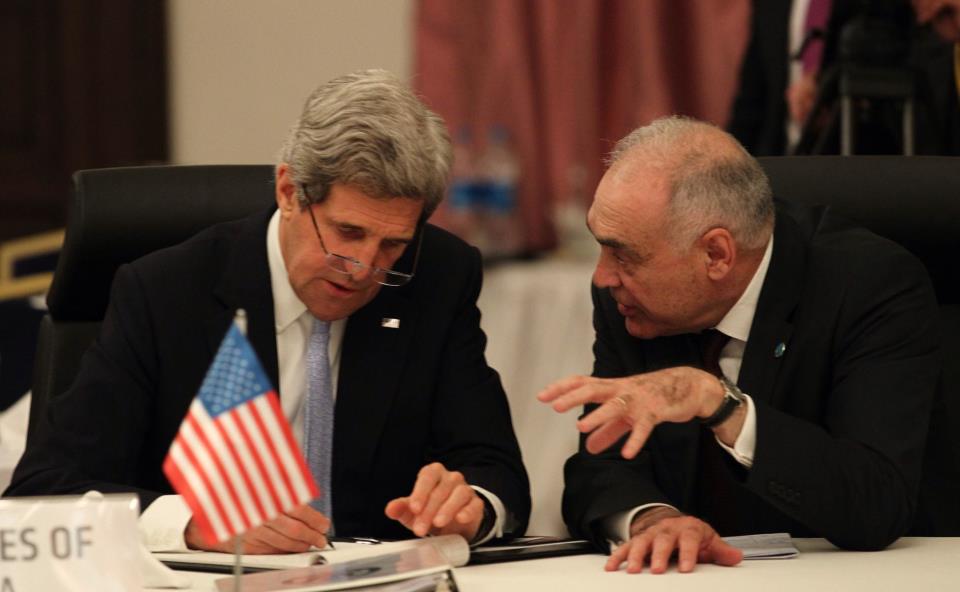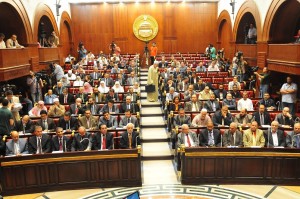By Hamza Hendawi and Maggie Michael / AP
CAIRO: The tens of thousands of Egyptians whose chants for faster change are ringing through Cairo’s Tahrir Square months after they brought down Hosni Mubarak have gotten a stern warning from the ruling generals not to disrupt daily life in what some activists are calling a second revolution.
The crowds again packing the powerfully symbolic square that was the center of the 18-day uprising in January and February defied the military council and staged a sit-in there for a fifth straight day on Tuesday, shutting down the heart of downtown Cairo and blocking access to a major government building, which was reopened early Wednesday.
Under a baking summer sun, they revised the slogan that resounded in Tahrir in the winter, which went, “The people want to bring down the regime.” On Tuesday, they cried out: “The people want to bring down the military junta,” in reference to the generals who took control as Mubarak stepped down.
Activists who once viewed the army as allies now accuse the military council of stalling on demands to bring police and ex-regime figures to justice for abuses during Mubarak’s nearly three decades in power and for the deaths of nearly 900 people in the Jan. 25-Feb. 11 protests.
“We either get their rights back, or we die like them,” screamed the crowd, alluding to the crackdown victims.
An estimated 30,000 people filled the square Tuesday, and tents and banners have sprung up again, giving the round-the-clock protest camp an air of semi-permanence like it had in the winter.
In another scene reminiscent of the uprising and the tactics Mubarak’s police state used to try to snuff it out, a band of 30 men armed with sticks set upon protesters, wounding six of them.
Hours later, the military issued a thinly veiled threat to use force.
“All options are open to solve this situation,” military council spokesman Mahmoud Hegazi told reporters.
A statement read out on state TV by finger-wagging council member Maj. Gen. Mohsen El-Fangari warned protesters against “harming national interests.” And ominously, it called on “honorable” Egyptians to confront actions that disrupt a return to normal life, something many interpreted to be a call on Egyptians to turn against each other.
Protesters ridiculed his threatening tone.
“Oh, Fangari and your finger, we don’t respond to arm twisting. We don’t have demands. We have orders,” a protester screamed from atop one of the square’s podiums.
The protesters’ new display of street power — not just in Cairo but around the nation — in recent days appears to be spurring the military and the interim government to act.
Interim Prime Minister Essam Sharaf, whose office near Tahrir was surrounded by thousands of protesters Tuesday, said he planned to change many of the country’s provincial governors by the end of the month, weeding out Mubarak loyalists.
A day earlier, he said he would reshuffle the Cabinet within a week. His interior minister, Mansour El-Essawy, plans this week to retire dozens of police commanders thought to have been involved in the killing of protesters or rights abuses.
Also Tuesday, Egypt’s state news agency said the Supreme Judicial Council, Egypt’s highest legal body, has decided to allow live transmission of the trials of Mubarak-era officials accused of corruption as well as police officers charged with killing protesters.
The footage will be relayed to screens installed outside courthouses for the public to watch, it said. Protesters have been complaining of the lack of transparency in these trials.
Sharaf also announced on his Facebook page that he had accepted the resignation of Deputy Prime Minister Yahia El-Gamal, who has been widely criticized for his erratic behavior, seeking publicity and reconciliatory approach toward businessmen backed by Mubarak’s regime.
However, the protesters also want the powers of the military council to be curtailed and defined, giving Sharaf more leeway to introduce reform and cull Mubarak loyalists from the civil service, state media, the judiciary and the estimated 500,000-strong police force.
In a nod to the demands of some of the protesters, the military announced what in effect is a delay in elections that have been widely expected to be held in September. It said preparations for the vote will begin Sept. 30.
Many of the new political parties that arose from the uprising wanted to have the vote delayed so they can compete more effectively against the better prepared and financed Islamists, like the Muslim Brotherhood.
The military also said it would draft a set of regulations for selecting the 100-member assembly that will write a new constitution. That would deprive any Brotherhood-led legislature of the chance to choose the body and thereby give the charter an Islamist slant.
At Tahrir Square, antimilitary sentiment was running high.
Amal Aboud, a government employee who joined the crowd, said many Egyptians once thought of the military as reluctant allies in pressing Mubarak to step down. “Now we are saying they are collaborating against the revolution.”
Rights activists at home and abroad say at least 10,000 people have been tried by military tribunals for alleged security offenses since the army took over the streets from the police in the early days of the uprising on Jan. 28.
Tuesday’s military statement said the generals had no intention of abandoning the role they assumed when Mubarak stepped down, running the country until a democratically elected government is in office.
Presidential hopeful, Nobel peace laureate Mohamed ElBaradei, sought in a statement to soothe fears of a rift between the military and the protesters.
“I have no doubt that the objectives of the people and the military are identical, which is to get through this critical time for Egypt and reach safe shores,” he said. “But this hinges more than any other time on our unity, to find what unites us and rise above what separates us,” he said. –Associated Press writer Sarah El Deeb contributed to this report.

